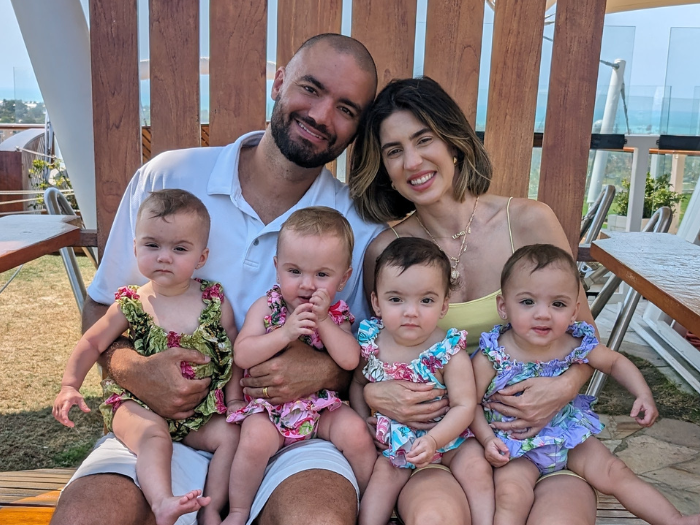Who: Devon, 30, and Mayra B., 34, Jupiter, Florida
Surprising Oura insight: After having four babies, Mayra continued to track her sleep with Oura and was surprised to see that she was still getting good Sleep Scores. She also noticed that she was transitioning into deep sleep stages early in the night, probably thanks to tiredness!
Eager to start a family, Devon and Mayra B. began using Natural Cycles powered by Oura to track Mayra’s cycle while trying to conceive. After several months without success, their doctor prescribed a low dose of Clomid to assist with ovulation. The next month, they were thrilled to learn they were pregnant!
Their excitement quickly turned to shock at their first ultrasound when they discovered they were expecting quadruplets. After a challenging 30-week pregnancy, Mayra gave birth to four healthy baby girls, who spent a few weeks in the NICU before going home. Now, after an eventful first year, their daughters have just turned one.
Read on to discover how they used Oura throughout the quadruplet pregnancy and now as they care for their four daughters.

What led you to Oura?
Devon: I was looking for a minimalist solution to track my sleep and activity. I was on a health journey at the time, and knew that Oura data would be invaluable in painting a more holistic picture of my health. I’ve now been an Oura member for three years.
Mayra: I originally bought Oura to learn more about my overall health and menstrual cycle. Initially, I used the Natural Cycles integration as a hormone-free birth control method, then later began using Natural Cycles powered by Oura to plan a pregnancy.
How did Oura support you before and during your pregnancy?
Mayra: Using Natural Cycles powered by Oura, I’d know when I was ovulating, so would try to conceive during those days. This took the guesswork out of the process because I knew the integration was consistently measuring my temperature trends.
In the early stages of my pregnancy, I kept an eye on my Oura data to see how the pregnancy was progressing and how my biometrics were changing.
Throughout the pregnancy, it was vital that I got enough sleep because my body was growing four humans! So I used Oura to ensure I was getting at least eight hours a night, even though sometimes it was really hard to get this because there were four humans inside my body!
READ MORE: How to Sleep Better During Pregnancy
What have you learned about your sleep with Oura, both pre- and post-babies?
Devon: Before the babies, I used to have a consistently high Sleep Score. If I were tired or had a sleepless night, I had the luxury of sleeping in to compensate. That isn’t an option now! I wake up frequently during the night to make a bottle or soothe a crying baby. I’ve noticed in my Oura data that I get a lot less deep sleep than before, which can leave me feeling tired and groggy in the morning.
Mayra: My sleep is very limited now! But Oura is still helpful. I’ve noticed that I actually transition into deep sleep earlier in my sleep than I did before the babies. I think it’s because I’m more tired. My Restfulness contributor is always low because I wake up every few couple of hours to soothe one of the babies.
But overall, I still get fairly high Sleep Scores, which has shocked me! My body has adapted well, and seeing that my Oura data reflects that is empowering.
How does Oura support your overall health and habits as parents of quadruplets?
Devon: Oura helps me identify why I’m feeling a certain way, and what I can tweak in my routine to improve it. For instance, if I have brain fog, I can look at my Oura App and see that it might be because I only got 20 minutes of deep sleep. Another common culprit is a lack of movement throughout my day, since I work from home. This motivates me to go for an evening walk to boost my mood.
My stress levels have been higher than usual, as reflected in the Daytime Stress feature. Oura helped me notice a pattern: on days with higher stress, I tended to eat more at night. This motivated me to start intermittent fasting, and I’ve since lost 30 pounds.
Mayra: I use Oura to see how my body is recovering postpartum and to track my cycle. I’ve been able to watch my cycle pretty much go back to normal, which is a good feeling. It’s encouraging to know where your body is at. In a world where women’s health is never the focus, Oura is the most valuable tool for me at the moment.
I also love that Oura gives me useful tips and insights on how to prepare for the day ahead. While I can’t always “take it easy,” it reminds me to take breaks when possible. If I have had a few consecutive bad nights of sleep or stressful days, I try to focus on recovery, even if that means not working out or taking a nap.
The Resilience feature helps me see how I’m taking care of myself over time, which as a quadruplet mom, is really important. Every day can’t be perfect, but if I’m doing well overall, that’s encouraging.
READ MORE: Oura’s Commitment to Prioritizing Women’s Health
What advice would you give to new parents?
Devon: Get outside as often as you can. Fresh air and sunlight can give you a dopamine boost that can relieve the stress and tiredness that come with being a new parent. Also, prepare to experience worse-than-normal sleep. Though you’ll still probably get more sleep than us, we’re handling it, and so can you!
Mayra: Be patient and kind to yourself. And do whatever you can to prioritize sleep! You can’t function without it. Lack of sleep was one of my biggest fears as a new parent, but fortunately, our bodies are very adaptable and resilient and can rise to the occasion.
RELATED:How Bridgette S. Manages Postpartum Anxiety While Planning a Second Pregnancy
What’s Your Oura Story?
Everyone’s story is unique, and we’d love to hear yours. Share your story here.










